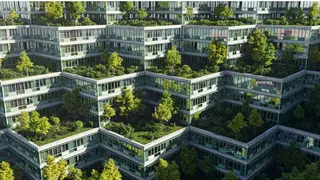Innovation is at the heart of sustainability initiatives taken by the corporate sector the world over. Be it a cement unit, a paper maker, an FMCG company, IT services firm or a realtor, they must constantly be inventive in their response to climate concerns because the goalpost keeps shifting as priorities get redefined.
In this context, what are the core philosophies that currently drive sustainability initiatives among Indian corporates? BusinessLine touched base with select companies for insight into their perspective and work in progress.
Mitigating climate change impact
ITC, the Indian MNC that manufactures a range of FMCG products, has been carbon positive for 14 years in a row. It has also been water positive for 17 consecutive years and solid waste recycling positive for the last 12. It continues to work towards triple bottom line performance at a time when sustainability and CSR are still on the fringes. Currently, over 41 per cent of total energy consumed by the company is from renewable sources, and 24 of its buildings have been LEED Platinum certified.
Chitranjan Dar, Group Head for Environment Health and Safety, Projects and R&D at ITC, explains the group’s strategy: “Making societal value creation is the bedrock of our corporate strategy. ITC has pursued innovation in business models that synergise the building of economic, ecological and social capital as a unified strategy. These models mitigate the impact of climate change through large-scale initiatives in water stewardship, integrated waste management, afforestation and use of renewable energy, among others, besides creating sustainable livelihoods among rural communities.”
ITC’s afforestation programme now covers 7,30,000 acres and has generated over 135 million person-days of employment. Its agro-forestry model, which covers over 1.12 lakh acres, allows pulpwood and agricultural crops to be grown simultaneously without impacting wood productivity.
Bosch India Ltd, a supplier of technology and services in the areas of mobility solutions, industrial technology, consumer goods, and energy and building technology, hopes to achieve carbon neutrality by 2020. Notes Soumitra Bhattacharya, the managing director: “For Bosch, sustainability means securing the company’s long-term success along with helping protect the environment for current and future generations. In line with our target to be carbon neutral worldwide by 2020, we are pursuing neutrality by tapping locally available, natural sources of energy.”
The company’s Nashik plant, in Maharashtra, has around 50,000 solar panels, generating close to 20 per cent of the power required. The facility has reduced its carbon emissions by close to 23,000 tonnes and saved around 25,000 MW hours of energy since 2015. Similarly, its Bidadi plant in Karnataka covers around 30 per cent of its energy needs with a photovoltaic set-up. Rainwater is also being harvested here, to replenish water supply for the local population.
Pushing the boundaries
IT major Infosys too has been chipping in. It has reduced its per capita electricity consumption by 55 per cent from its 2008 levels and its per capita water consumption by 60 per cent. It also implements carbon offset projects and aims to become carbon neutral by 2020.
Says Guruprakash Sastry, Regional Head, Infrastructure, Green Initiatives, “Technologies like prefab construction, radiant cooling, smart automation and innovative solar PV plants are being taken up in our campuses. Our carbon offset projects in rural India include household biogas units, efficient cookstoves, solar lighting, and positively impacting over 11 of the 17 Sustainable Development Goals (SDGs).”
Milind Lakkad, EVP & Global Head-HR, TCS says, “TCS believes in ‘Impact through Empowerment.’ TCS is deeply rooted in all the communities it operates in globally, through volunteering efforts undertaken by our employees.”
TCS’ environmental sustainability strategy is implemented through standardised processes, monitoring the environmental impact performance and strong partnerships with stakeholders, including employees as well as customers, Lakkad says.
“Having achieved our 2020 target to reduce the specific carbon footprint by 500 per cent, TCS is now working on the next stage of our environmental sustainability targets.”
Energy Efficiency Services Ltd (EESL), set up by the Centre in 2009, claims to be handling the “world’s largest energy efficiency portfolio within the country”. This includes making affordable energy efficient appliances accessible in the hinterland, implementing solutions such as smart meters and e-mobility initiatives in various States. According to Venkatesh Dwivedi, director (projects), the company aligns with SDG 7 on affordable and clean energy for all. “Our Street Lighting National Programme alone reduces 4.26 million tonnes GHG emission annually,” he adds.
Innovation through co-processing
Cement, steel, mining and automobiles are often identified as sectors that are guilty of polluting the environment. But efforts are on to correct this. Ambuja Cements is a case in point. It uses waste outputs generated by other industries to co-process alternative fuels. Explains Bimlendra Jha, MD & CEO of Ambuja Cement: “Cement and steel are key building materials but historically known for greenhouse gas emissions. It may, therefore, come as a surprise to many that a cement company can actually be a solver of society’s problems of waste disposal. We have reduced our carbon footprint by nearly 31 per cent from our 1990 levels.”
“Among other initiatives, the company has been using the waste output of coal-based power plants and it has reduced ground pollution by co-processing alternative fuels, biomass and plastics in place of non-renewable fuels such as coal. “Additionally, Ambuja Cement has ensured a rise in the water table around most of its mining operations through water harvesting,” he adds.
According to N Baijendra Kumar, CMD of the State-owned iron ore mining major NMDC Ltd, responsible mining is at the heart of his company’s work ethic and NMDC has aligned itself with sustainable development goals. “We leverage business opportunity, minimise risk and seek to overcome social and business challenges such as scarcity of resources and climate change at an early stage. We have been an early signatory to UN Global Impact Network,” says Jha.
“The quality of air around the globe is currently a matter of serious international concern. It is our collective responsibility to make this world a better place to live and breathe in and we need to educate, encourage and empower our society to take care of the environment, starting at the grass root level. At Hero Electric, we acknowledge this critical need and have been working towards this cause for the last ten years. Our vision is to usher India into an era of cleaner and greener future, powered by electric mobility. This World Environment Day, we aim to provide ‘Zero Emission’ sustainable mobility in the country,” says Sohinder Gill, CEO Hero Electric India.
Different strokes
There are several other companies trying to make the right eco-friendly moves. Tanishq, the jewellery brand of the Tata Group, has initiated several projects at its main manufacturing facility at Hosur, outside Bengaluru, including a Miyawaki-style forest in front of its new warehouse facility to increase biodiversity. The company planted 2,750 native trees which fall into the fruit bearing, bird attracting, flowering, medicinal and ornamental varieties. The project reduces carbon footprint by 60 tonnes per annum.
Forests are also on the agenda of Hyderabad-based real estate developer, the Phoenix Group. It has proposed to set up a 500-acre biosphere to serve as a carbon sink for the Hyderabad capital region. It is also adopting a forest and undertaking re-foresting which includes translocating trees on the Hyderabad-Bijapur Highway. Says Joe King, the CEO, “We have also stopped usage of plastic bottles across all our offices and have replaced them with glass bottles.”
Snacking right
Ophira Bhatia, Director-Corporate & Government Affairs, Mondelez India, says the company believes that people should not have to choose between snacking and eating right, or to be concerned about the impact their snacking choices have on the world. This means making snacking both sustainable and mindful by creating a future where people and planet thrive, and evolving their portfolio to inspire mindful snacking habits.
“Our partnership with cocoa farmers in India goes back close to 55 years. Our Cocoa Life programme has been partnering with 1,00,000 farmers, providing over 3 million seedlings annually and supporting them to grow sustainable cocoa as an inter-crop. This has led to increasing farm productivity and income and generating employment which has positively impacted communities.
“Mondelez India has also been certified by E&Y to be water and carbon positive and zero waste to landfill. As part of our extended producer responsibility, we are also working to collect, segregate and recycle plastics. And we have planted close to 20,000 trees in the last two years as we focus on driving our environmental commitments,” says Bhatia.
The good news on World Environment Day is that corporate India is trying to respond to the challenges faced by the environment. But will individual efforts be enough to reverse the large-scale damage caused to the planet through years of neglect? Much more will need to be done if we want to avoid the situation of too little, too late.








Comments
Comments have to be in English, and in full sentences. They cannot be abusive or personal. Please abide by our community guidelines for posting your comments.
We have migrated to a new commenting platform. If you are already a registered user of TheHindu Businessline and logged in, you may continue to engage with our articles. If you do not have an account please register and login to post comments. Users can access their older comments by logging into their accounts on Vuukle.